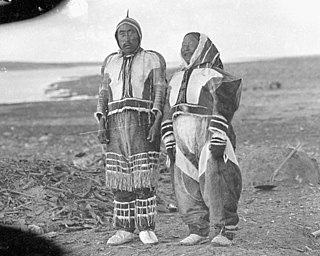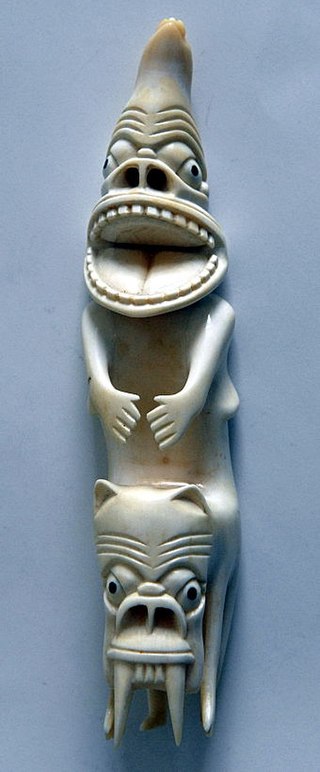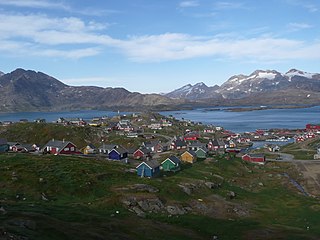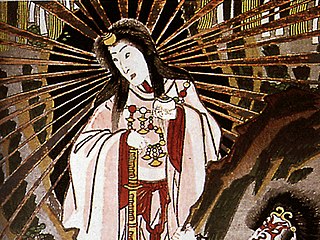Related Research Articles
Inuit religion is the shared spiritual beliefs and practices of the Inuit, an indigenous people from Alaska, northern Canada, parts of Siberia, and Greenland. Their religion shares many similarities with some Alaska Native religions. Traditional Inuit religious practices include animism and shamanism, in which spiritual healers mediate with spirits. Today many Inuit follow Christianity ; however, traditional Inuit spirituality continues as part of a living, oral tradition and part of contemporary Inuit society. Inuit who balance indigenous and Christian theology practice religious syncretism.

Robert Persons, later known as Robert Parsons, was an English Jesuit priest. He was a major figure in establishing the 16th-century "English Mission" of the Society of Jesus.

The Inuit angakkuq is an intellectual and spiritual figure in Inuit culture who corresponds to a medicine man. Other cultures, including Alaska Natives, have traditionally had similar spiritual mediators, although the Alaska Native religion has many forms and variants.
Stanley James Grenz (1950–2005) was an American Protestant Christian theologian and ethicist in the Baptist tradition.
Stephen John Hunt is a British professor of sociology at the University of the West of England. Prior to his appointment at the University of West England in 2001, Hunt had taught at the Sociology Department at the University of Reading for thirteen years, as well as in the Religious Studies Department at the University of Surrey, Roehampton.
Robert John Russell is founder and Director of the Center for Theology and the Natural Sciences (CTNS). He is also the Ian G. Barbour Professor of Theology and Science in Residence at the Graduate Theological Union (GTU). He has written and edited extensively on possible scientific mechanisms of Christian belief.

Traditional Alaskan Native religion involves mediation between people and spirits, souls, and other immortal beings. Such beliefs and practices were once widespread among Inuit, Yupik, Aleut, and Northwest Coastal Indian cultures, but today are less common. They were already in decline among many groups when the first major ethnological research was done. For example, at the end of the 19th century, Sagdloq, the last medicine man among what were then called in English, "Polar Eskimos", died; he was believed to be able to travel to the sky and under the sea, and was also known for using ventriloquism and sleight-of-hand.
Mutual aid is an organizational model where voluntary, collaborative exchanges of resources and services for common benefit take place amongst community members to overcome social, economic, and political barriers to meeting common needs. This can include physical resources like food, clothing, or medicine, as well as services like breakfast programs or education. These groups are often built for the daily needs of their communities, but mutual aid groups are also found throughout relief efforts, such as in natural disasters or pandemics like COVID-19.
Secular theology is a term applied to theological positions influenced by humanism and secularism, rejecting supernatural metaphysical positions related to the nature of God. Secular theology can accommodate a belief in God, like many nature religions, but as residing in this world and not separately from it.

A tupilaq is a monster or carving of a monster.
Hugh or Hugo was a Benedictine monk and historian. He served as abbot of Flavigny from 1097 to 1100.
Vincent Brümmer was a South African-born Christian theologian who worked for most of his career in the Netherlands. From 1967 to 1997 he was the Professor of Philosophy of Religion at the University of Utrecht.
Umik was an Inuk angakkuq (shaman) who proclaimed himself a Christian evangelist and began to preach to the Igloolik Inuit in the 1920s.
Donald Suluk was an Inuk religious figure who preached a syncretic form of Christianity in Nunavut in the 1940s.
In Greek religion and mythology, Theandrios or Theandrates (Θεανδράτης) is a deity that was worshipped in towns and villages around Mount Hermon by North Arabian tribes of pre-Islamic Arabia. Theandrios is evidenced by a dedication to a male god found at Beit Rime, Syria and it is supposed that the Greek name was imposed on a previous god of the region. He has been considered the Arabian version of similar "God-man" deities such as Dionysus, Heracles, Mithras, Krishna and Jesus.

Iivit or Tunumiit are Indigenous Greenlandic Inuit from Iivi Nunaa, Tunu in the area of Kangikajik and Ammassalik, the eastern part of Inuit Nunaat. The Iivit live now mainly in Tasiilaq and Ittoqqortoormiit and are a part of the Arctic people known collectively as the Inuit. The singular for Iivit is Iik or for Tunumiit version it is Tunumiu.

The Battle of Kunovica or Battle at Kunovitsa was fought between crusaders led by John Hunyadi and the armies of the Ottoman Empire on 2 or 5 January 1444, near the mountain Kunovica between Pirot and Niš, in present-day Serbia. It was part of the larger Crusade of Varna.

An akuma (悪魔) is an evil spirit in Japanese folklore, sometimes described in English-language sources as a devil or demon. An alternative name for the akuma is ma (ま). Akuma is the name assigned to Satan in Japanese Christianity, and the Mara in Japanese Buddhism.

Quviasukvik, is the first day of the year according to Inuit. The festival of the New Year is celebrated by Inuit, Yupik, Aleuts, Chukchi, NunatuKavummiut and the Iñupiat. The feast originally derives from traditional Inuit religion but in modern times, it has Christian influences.
Mark Tungilik (1913?–1986) was an Inuk sculptor from Nunavut who specialized in miniature ivory carvings.
References
- ↑ Aparecida Vilaça, Robin Wright. Native Christians: Modes and Effects of Christianity Among Indigenous Peoples of the Americas. Ashgate Publishing, Ltd., 2009 ISBN 0-7546-6355-8, ISBN 978-0-7546-6355-3
- ↑ "Life Story of Victor Tungilik | Listening to Our Past".